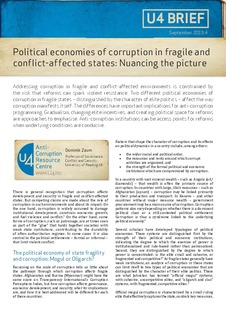| dc.contributor.author | Dominik, Zaum | |
| dc.date.accessioned | 2018-01-04T08:18:04Z | |
| dc.date.available | 2018-01-04T08:18:04Z | |
| dc.date.issued | 2013-09-20 | |
| dc.identifier | oai:www.cmi.no:4901 | |
| dc.identifier.citation | Bergen: Chr. Michelsen Institute (U4 Brief 2013:4) 4 p. | |
| dc.identifier.uri | http://hdl.handle.net/11250/2474829 | |
| dc.description.abstract | Addressing corruption in fragile and conflict-affected environments is constrained by the risk that reforms can spark violent resistance. Two different political economies of corruption in fragile states – distinguished by the character of elite politics – affect the way corruption manifests itself. The differences have important implications for anti-corruption programming. Gradualism, changing elite incentives, and creating political space for reforms are approaches to emphasise. Anti-corruption institutions can be access points for reforms when underlying conditions are conducive. | |
| dc.language.iso | eng | |
| dc.publisher | Chr. Michelsen Institute | |
| dc.relation | U4 Brief | |
| dc.relation | 2013:4 | |
| dc.relation.ispartof | U4 Brief | |
| dc.relation.ispartofseries | U4 Brief 2013:4 | |
| dc.relation.uri | https://www.cmi.no/publications/4901-political-economies-of-corruption-in-fragile-and | |
| dc.subject | Fragile States | |
| dc.title | Political economies of corruption in fragile and conflict-affected states: Nuancing the picture | |
| dc.type | Report | |
